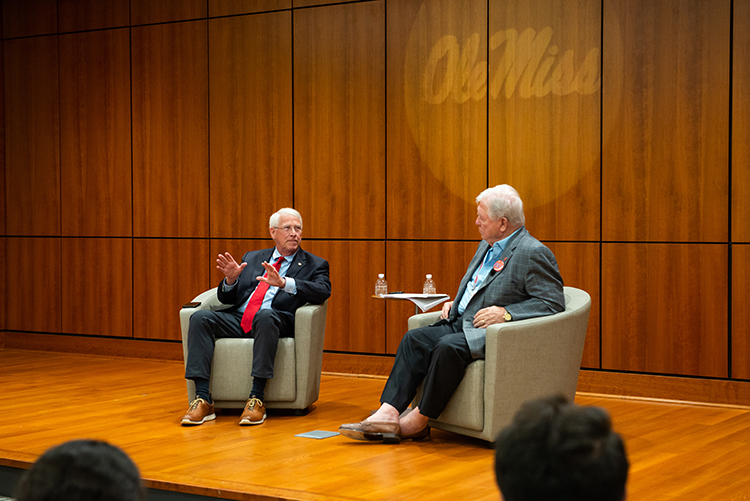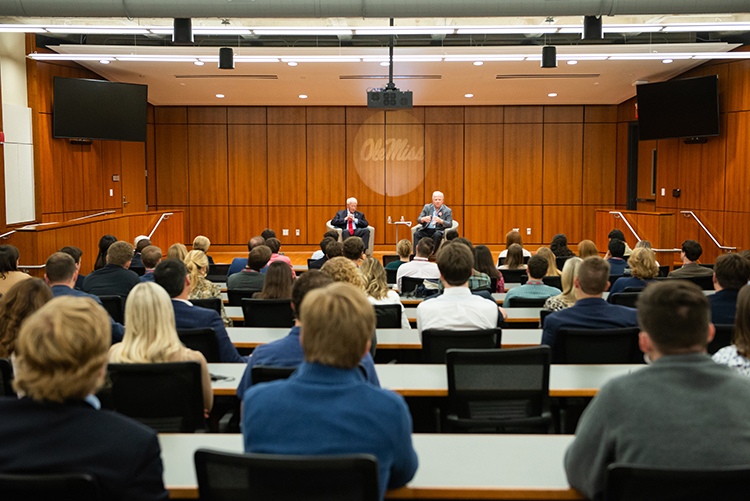
U.S. Sen. Roger Wicker (left) and former Gov. Haley Barbour discuss their experiences working with both sides of the political spectrum to accomplish bipartisan legislation. The leaders spoke to University of Mississippi students recently about leadership in a fractured political landscape. Photo by Bill Dabney/UM Foundation
Two of Mississippi‘s major political figures of the modern era used their decades of combined experience recently to share lessons with more than 100 University of Mississippi students about solving problems in a divided nation.
Former Mississippi Gov. Haley Barbour, who served from 2004 to 2012 and was also chairman of the Republican National Committee, and U.S. Sen. Roger Wicker, the state’s senior senator, spoke to students gathered October 22 in the Ole Miss Student Union auditorium. Their talk, “Solving Problems in a Divided Country” gave students a chance to hear from two of Mississippi’s most notable elected officials from the last 50 years.
Barbour, who holds a law degree from Ole Miss, is the namesake of the Haley Barbour Center for the Study of American Politics, part of the UM Department of Political Science. The current climate is unusual, he said.
“I have been doing this for 53 years and I can tell you we are at a time I find very unusual, very strange, unique; say whatever you will,” Barbour said. “Historically, when we are at parity, meaning equal strength between the two parties, and it’s happened from time to time, usually, except this time alone, we are all kind of bunched up in the middle.
“Right now, we are at parity, but there is no middle.”
The former governor said media has become more polarized, with cable news channels leaning either left or right, and voices on the extreme sides of issues have been amplified through social media in recent years. Misinformation abounds, Barbour said.
“You have millions of Americans who are putting out stuff that they have no idea whether it is true or not,” he said. “I have friends who were here at Ole Miss with me 50 years ago who send me stuff all the time that is just junk. Just made up.
“You see lots of the same stuff from the liberal media elite. It is just made up.”
Wicker, whom Barbour appointed to fill then-U.S. Sen. Trent Lott‘s vacant Senate seat in 2007, said he was happy to see the growth of cable news during the 1990s when Fox News came onto the scene, but agrees the current media landscape has become politicized.
“I was glad to have the balance (when Fox News came along).” Wicker said. “Now, those of us on the right side of the spectrum tend to go click on Fox News and we hear it all night long, reinforcing our tendency to move to the right. You have MSNBC, CNN, and the mainstream media on the left, and we seem to have lost the center on many issues.”
Wicker, who also earned bachelor’s and law degrees from UM, said he believes some issues that are not as often on the radar of news programs still have major worldwide implications. He believes there is much more agreement and cooperation on some of those issues.
“I would make a distinction between top-tier issues in Congress and those really important second-tier issues,” he said.
Wicker pointed to Barbour’s work to make changes to the Export-Import Bank and sees that as an example where bipartisan work happened. Critics of the fund on both the right and left had seen it as burdensome piece of corporate welfare that subsidized businesses, while others saw it as good policy for the United States.
Wicker said the issue was solved by leaders from both sides.
“People like you and I said everyone in the world is doing this and the EXIM makes money for the U.S. Treasury, which sounds like a good deal to me,” Wicker said. “That’s an issue where partisanship was supplanted by dearly held, strong views about how to create jobs in the United States of America.”
The Magnitsky Human Rights Accountability Act, which allows the U.S. government to sanction foreign government officials, was signed by President Barack Obama in 2016. Wicker said the bill he co-authored with U.S. Sen. Ben Cardin, a Democrat from Maryland, is another example of important “second tier” issues.
Supporters of the act say it broadens the nation’s response to human rights offenses around the world.
Barbour began his life in politics in 1968 as a field organizer on Richard Nixon‘s presidential campaign. From 1973 to 1976, he was executive director of the Mississippi Republican Party. Presidents Gerald Ford, George H.W. Bush, and Ronald Reagan were among the many Republican candidates who received his advice.
He also served as political director of the Reagan White House and cofounded BGR Group, a prominent Washington government affairs firm.
From 1993 to ’97, Barbour served as chairman of the Republican National Committee and managed the “Republican wave” in 1994, which led to Republican control of both the Senate and House of Representatives.
Besides discussing the changing media landscape, the former governor told the crowd that demanding “purity” from members of a political party, meaning they must agree with the party on all issues, also creates division.
During Barbour’s time leading the Reagan White House political operations, Republicans never had a majority in the House, but Reagan passed his economic plan and social security reform, among other initiatives, Barbour noted.
Reagan believed that demanding a purity test for candidates creates a less inclusive, less effective party.
“President Reagan would say that in two-party politics, ‘purity’ is the enemy of victory,” Barbour said. “Don’t forget that someone who agrees with you 80% of the time is your friend and your ally, and not some other person 20% of the time.”
James Hirsch, a senior public policy leadership and economics major from Kansas City, Missouri, said he was impressed with how the two handled the issues, both current and past.
“They spoke about policymaking during disasters with a confidence and tenderness that I hadn’t expected,” Hirsch said. “Gov. Barbour about the effect of Hurricane Katrina on the Mississippi Gulf Coast, and Sen. Wicker about infrastructure improvements in the wake of the COVID-19 pandemic.
“Both speakers emphasized the bipartisan nature of relief, and what Sen. Wicker called ‘second-tier issues’ as a place for policymakers to come together for the common good.”
Lila Osman, a junior public policy leadership major from Ocean Springs, said she enjoyed the event and particularly enjoyed hearing Barbour’s discussion of Hurricane Katrina.
“As Governor Barbour explained the handling the aftermath, he mentioned that he listened to the insight of others who had stake in the state, but ultimately all parties respected his decisions and leadership capabilities which in turn allowed him to act swiftly and efficiently in the time of dire need,” Osman said.
“I found both of their insight of the state of our nation very informative and impactful.”
By Michael Newsom





